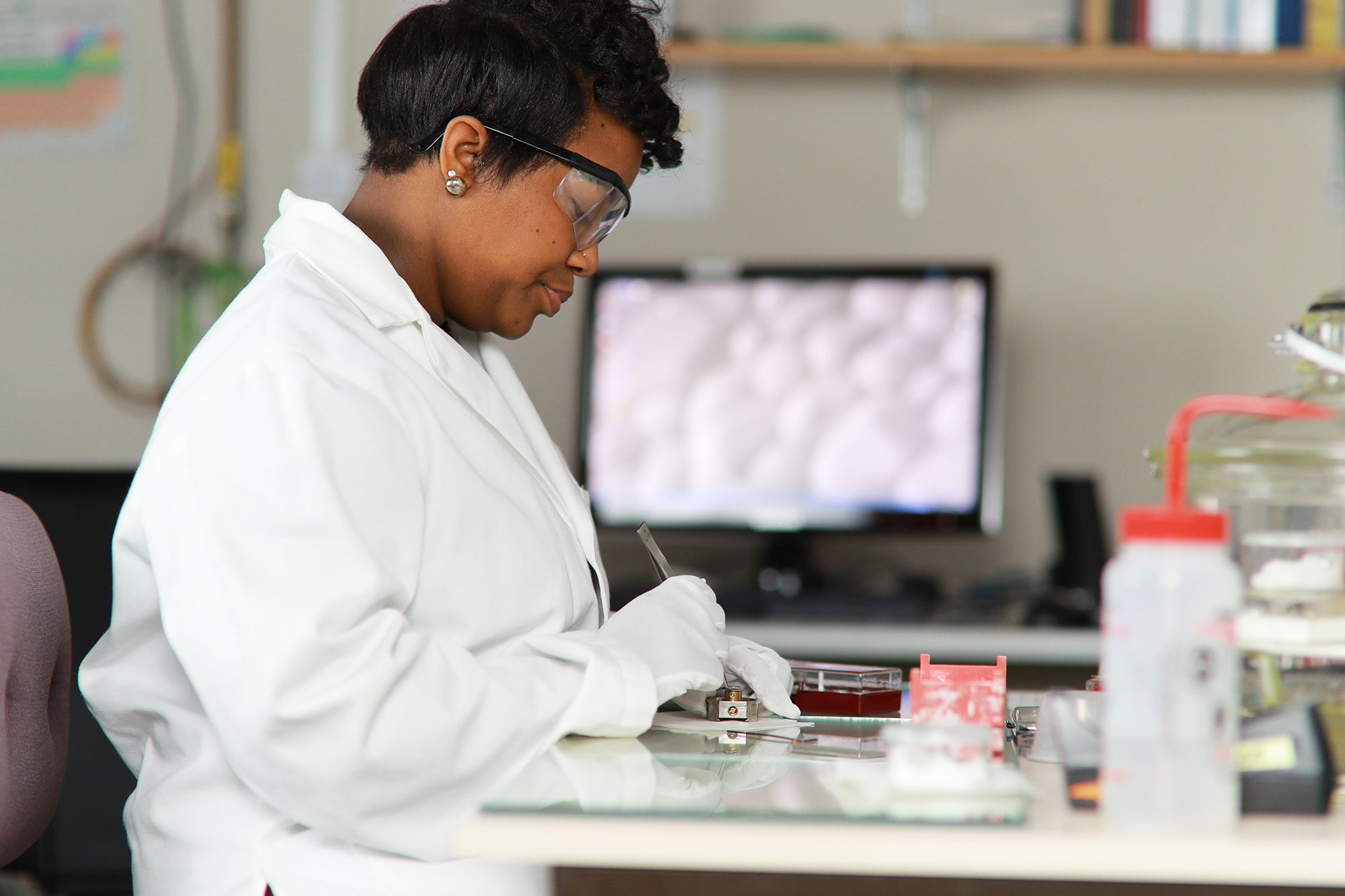Master's Degree in Chemistry, Non-Thesis Option
 The objective of the non-thesis M.S. program at UToledo is to provide an alternate
pathway for students to obtain an M.S. degree in chemistry that does not involve an
in-depth research project or a thesis. This degree option is intended for area residents whose current work responsibilities,
or intellectual property issues with their employer, preclude the possibility of conducting
the requisite research for the traditional research-based M.S. degree. School teachers,
non-traditional students, and employees of local industry who want to earn an M.S.
degree for promotions and/or to meet eligibility requirements for teaching positions
at regional community colleges may wish to pursue this degree option.
The objective of the non-thesis M.S. program at UToledo is to provide an alternate
pathway for students to obtain an M.S. degree in chemistry that does not involve an
in-depth research project or a thesis. This degree option is intended for area residents whose current work responsibilities,
or intellectual property issues with their employer, preclude the possibility of conducting
the requisite research for the traditional research-based M.S. degree. School teachers,
non-traditional students, and employees of local industry who want to earn an M.S.
degree for promotions and/or to meet eligibility requirements for teaching positions
at regional community colleges may wish to pursue this degree option.
Requirements
For the degree of Master of Science, Non-Thesis Option, students must meet the following departmental requirements:
- Entering graduate students must take placement examinations in analytical, biochemistry, general, inorganic, organic, and physical chemistry. Remedial courses at the undergraduate level will be required if deficiencies are indicated by the placement exams. Remedial course requirements are more likely for students that received their undergraduate education in a science-related area (e.g., biology, pharmacy, physics, science education) and do not have a B.S. degree in chemistry.
- Select a major advisor prior to the end of the first semester in the program.
- Prepare an M.S. Plan of Study in consultation with the major advisor. This must be completed by the end of the first semester in the program.
- Candidates must complete a minimum of 30 semester hours of graduate credit, of which at least 20 credit hours must come from 6000-level lecture courses in chemistry, and of which a maximum of 2 credit hours may come from colloquium (CHEM 6920). Up to 8 credit hours of 6000-level coursework in a related discipline (e.g., biology, chemical engineering, environmental sciences, medicinal chemistry, physics) may be applied to the 30 credit hour minimum if approved by the student’s major advisor and the Director of Graduate Studies. Credit for thesis research (CHEM 6960) or research seminar (CHEM 6930) cannot be applied towards the 30 hour minimum for the non-thesis M.S. degree. To establish breadth in knowledge, the candidate must complete at least one course in each of four (out of six) sub-disciplines of chemistry (analytical, biochemistry, inorganic, materials, organic, physical).
- Maintain a 3.00 grade point average in chemistry and a 3.00 GPA in all graduate coursework. A student who’s GPA, either in chemistry or overall, falls below 3.00 will not be in good standing and will be placed on academic probation. Two consecutive semesters of being found not in good academic standing will result in dismissal from the program.
- Candidates must complete Graduate Readings in Chemistry (CHEM 6940) and receive a grade of B or better. The Graduate Readings course is the culminating experience for the non-thesis M.S. degree. Students will prepare and present a departmental colloquium consisting of a concise, up-to-date review of the literature on a specific topic chosen in consultation with the instructor and advisor. Distribution of credit: one credit hour for a concise, written review, and one credit hour for the oral presentation to the department. This 2-credit course cannot be applied toward the 20 credit hours required for 6000-level lecture courses in chemistry. It is anticipated that the student will complete the readings course in their last or next to last semester in the program.
Restrictions
- This degree option is not intended for traditional, full-time students working towards attaining research or technical positions in industry.
- This degree option is not intended for students working towards a tenure-track faculty position in 4-year colleges and universities.
- Students pursuing this degree option are not eligible for assistantship support or tuition remission from the department. A semester of teaching assistantship (TA) support can be considered for those preparing for teaching positions in a community college and who would benefit from the teaching experience provided by the TA position. This is contingent upon the availability of TA funds.
- Full-time graduate students already in the M.S. or Ph.D. program in chemistry who wish to switch from the thesis to non-thesis track must seek formal approval from the Graduate Admissions and Graduate Standings Committees. If approved, this results in immediate loss of assistantship support and tuition remission. Also if approved, credit for thesis research (CHEM 6960) or research seminar (CHEM 6930) cannot be applied towards the 30 hour minimum for the non-thesis M.S. degree. Similarly, a maximum of 2 credit hours may come from colloquium (CHEM 6920).


